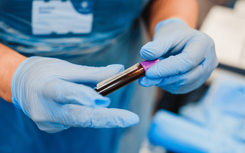
Can you drink water before a fasting blood test?
If you've been asked to fast before a blood test, you may be wondering what exactly that means, especially when it comes to drinking water. While skipping food for several hours can be straightforward, knowing whether or not you're allowed to stay hydrated often leads to confusion.
In most cases, drinking water is not only allowed but encouraged before a fasting blood test. But there are a few exceptions and best practices to keep in mind.
In this article, we explain what fasting means for a blood test, when and why it’s needed and how drinking water can affect your test results. We'll also answer some of the most frequently asked questions about preparing for a fasting blood test.
What is a fasting blood test?
A fasting blood test is a test that requires you to avoid eating or drinking anything other than water for a set period before your blood is taken. This is typically 8 to 12 hours, depending on the test.
The reason? Food and drink, especially those containing sugar, fat or caffeine, can temporarily alter the levels of substances in your blood, which could affect your results. Fasting helps ensure that your results are as accurate and consistent as possible.
Why are fasting blood tests needed?
Not all blood tests require fasting. Some tests can be sensitive to recent food and drink intake, such as:
-
Glucose tests – traditionally used to check for diabetes or monitor blood sugar levels.
-
Lipid profile tests – to measure cholesterol and triglyceride levels.
-
Iron tests – to check iron levels and screen for conditions like anaemia.
-
Liver function tests – sometimes historically recommended to be done fasting for accuracy.
-
Kidney function tests – may have been advised fasting depending on specific parameters.
At Bluecrest Wellness, we provide these tests without requiring fasting, in line with the latest evidence showing that fasting is not necessary for many of these checks. Your healthcare provider will guide you if any specific preparation is needed.
Can you drink water before a fasting blood test?
Yes, you can drink water before a fasting blood test, unless your healthcare provider tells you otherwise.
In fact, drinking water is generally encouraged. Here’s why:
-
It helps keep your veins hydrated, making it easier for the phlebotomist to draw your blood
-
It prevents dehydration, which can affect some test results
-
It reduces the risk of feeling dizzy or faint, especially after fasting overnight
However, it’s important to stick to plain water only. This means:
-
Still or sparkling water (without flavouring)
-
No tea, coffee or juice
-
No flavoured or infused water
-
No chewing gum or mints (they can trigger digestion)
How much water can you drink?
There’s no strict limit to how much water you can drink before a blood test, but moderation is key. A glass or two of water in the morning before your appointment is usually enough to keep you hydrated without overfilling your bladder.
If you're someone who typically wakes up thirsty, feel free to sip water during your fasting window. Just avoid gulping down large amounts right before your test, as this can dilute certain markers in the blood.
What should you avoid before a fasting blood test?
If your test requires fasting, you’ll typically need to avoid the following for 8 to 12 hours beforehand:
-
Food and snacks
-
Alcohol
-
Caffeinated drinks (coffee, tea, energy drinks)
-
Soft drinks or fruit juices
-
Smoking or vaping
-
Chewing gum
Some medications may also affect blood test results. Always check with your healthcare provider if you're taking prescription drugs or supplements, as they’ll advise whether or not you need to pause them before your test.
When should you start fasting?
Fasting periods typically range from 8 to 12 hours, depending on the type of test.
The easiest approach is to schedule your blood test in the morning and begin fasting the night before. For example, if your test is at 9am and you need to fast for 12 hours, stop eating and drinking (except water) by 9pm the previous night.
What happens if you accidentally eat or drink something?
If you’ve unintentionally eaten or had a drink other than water during your fasting period, it’s important to let your healthcare provider know before the test. Depending on the type of test, they may ask you to reschedule to ensure more accurate results.
Accidentally breaking a fast, especially with food or sweetened drinks, can cause:
-
Blood sugar levels to rise
-
Triglyceride levels to spike
-
Insulin and hormone responses to alter
-
Hydration levels to shift
These changes could affect your results and potentially lead to an incorrect diagnosis or a need for repeat testing.
Are there risks to fasting before a blood test?
Fasting is generally safe for most people. However, if you have a medical condition like diabetes or are prone to feeling faint, it's important to discuss fasting with your doctor beforehand.
Some people may experience:
-
Light-headedness
-
Fatigue or irritability
-
Mild dehydration (if not drinking water)
These symptoms are typically mild and resolve once you’ve had something to eat after your test.
Tips to prepare for a fasting blood test
To make your fasting blood test go smoothly:
-
Drink plenty of plain water
-
Avoid strenuous activity before your test
-
Wear loose-fitting clothing for easier access to your arm
-
Bring a snack to eat afterwards, especially if you feel faint
-
Schedule a morning appointment to reduce the fasting window while you're awake
Support for a wide range of blood tests at Bluecrest
At Bluecrest Wellness, we offer private full body private health checks that include a wide range of blood tests, including glucose and cholesterol checks, all available without the need for fasting.
Each Health MOT includes a selection of tests tailored to your age and health profile, with results typically available within around eight days. You'll also receive a detailed, easy-to-understand report and a year’s access to our 24/7 GP helpline, giving you extra support beyond the test day.
Need help? Call free on
to speak to one of our team.

Anna Jones
Chief Nursing Officer, Bluecrest
Dr Martin Thornton
Chief Medical Officer, Bluecrest


























